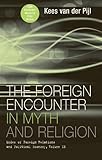The foreign encounter in myth and religion : modes of foreign relations and political economy. Volume II / Kees van der Pijl.
Material type: TextSeries: Pijl, Kees van der. Modes of foreign relations and political economy ; v. 2.Publication details: London ; New York : Pluto ; New York : Distributed in the USA by Palgrave Macmillan, 2010.Description: 1 online resource (xv, 243 pages) : illustrationsContent type:
TextSeries: Pijl, Kees van der. Modes of foreign relations and political economy ; v. 2.Publication details: London ; New York : Pluto ; New York : Distributed in the USA by Palgrave Macmillan, 2010.Description: 1 online resource (xv, 243 pages) : illustrationsContent type: - 9781849644495
- 1849644497
- International relations
- International relations -- History
- Religion and international relations
- International relations -- Moral and ethical aspects
- Relations internationales
- Religion et relations internationales
- Relations internationales -- Aspect moral
- international relations
- POLITICAL SCIENCE -- Government -- International
- POLITICAL SCIENCE -- International Relations -- General
- POLITICAL SCIENCE -- Public Policy -- Economic Policy
- International relations
- International relations -- Moral and ethical aspects
- Religion and international relations
- 327 22
- JZ1242 .P55 2010eb
- online - EBSCO
| Item type | Current library | Call number | URL | Status | Notes | Barcode | |
|---|---|---|---|---|---|---|---|
 eBook
eBook
|
Biblioteca "Angelicum" Pont. Univ. S.Tommaso d'Aquino Nuvola online | online - EBSCO (Browse shelf(Opens below)) | Online access | Not for loan (Accesso limitato) | Accesso per gli utenti autorizzati / Access for authorized users | (ebsco)329531 |
Browsing Biblioteca "Angelicum" Pont. Univ. S.Tommaso d'Aquino shelves, Shelving location: Nuvola online Close shelf browser (Hides shelf browser)
Includes bibliographical references (pages 223-235) and index.
Tribal foreign relations and mythical ancestry -- Sedentary-nomad encounters in Semitic myth and religion -- Warrior heroes in the Indo-European lineage -- Imperial cosmologies and the nomad counterpoint -- Rival fundamentalisms on the imperial frontier.
Print version record.
How do we think about international relations? There is no question that society is based upon its cultural foundations, yet this mode of understanding the world is seemingly absent from IR. The second volume of Modes of Foreign Relations and Political Economy, a three-volume project changing the way we think about international relations, traces the key characteristics of 'foreign encounters' over time. It shows that myth, religion and ethical philosophies have always informed the way that societies have interacted with outsiders, from tribal relations to the imperial frontiers. Acceptance of this points us towards the future state of international relations. A truly masterful work, The Foreign Encounter In Myth And Religion, is a must for upper-undergraduates and academics at the cutting edge of international relations theory.









